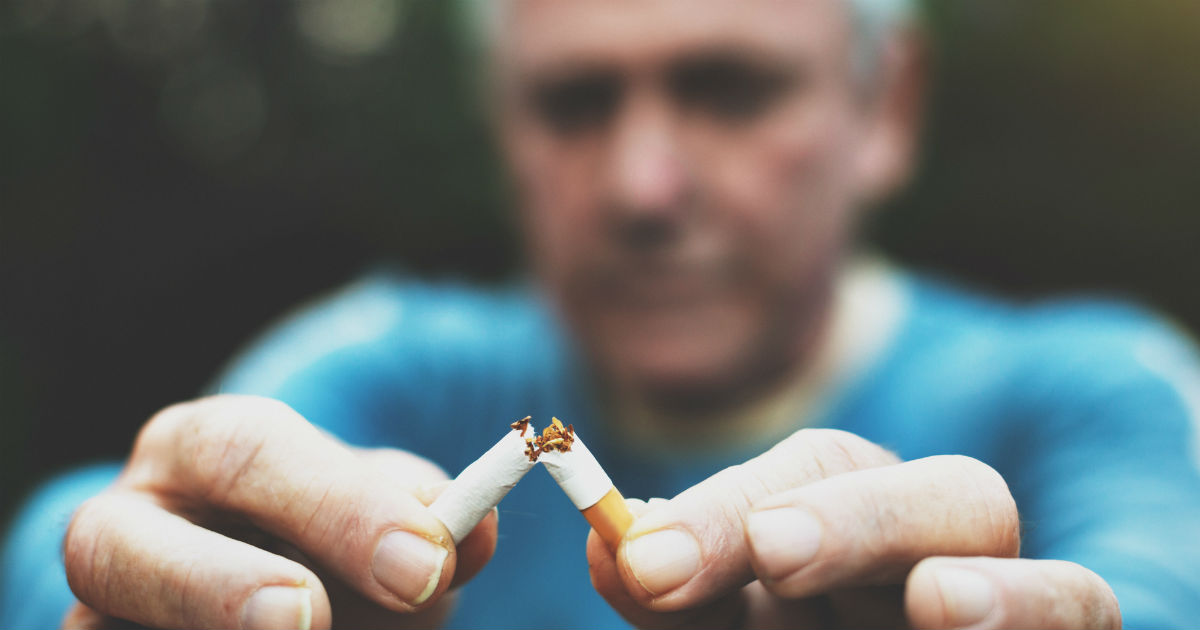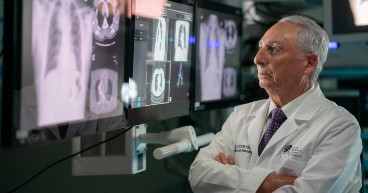
Smoking is dangerous, even deadly. That universally understood statement will hardly come as a surprise to anyone reading this. The serious health impacts of tobacco use have been well documented and widely publicized for decades. And yet, despite the warnings about the risk for life-threatening diseases like heart failure, cancer, stroke and diabetes, an estimated 34.2 million Americans continue to smoke.
Among them are men and women who already have cancer. In fact, an American Cancer Society study found that, nine years after being diagnosed with cancer, 10 percent of patients continued to smoke cigarettes, and the vast majority—more than 80 percent— smoked daily.
Those statistics point to another well-known fact: Quitting smoking is exceedingly hard to do. The nicotine in tobacco is highly addictive, and the physical and mental side effects of quitting, for many, are severe. So, if you’re a smoker who has tried to quit and found it too difficult, you’re not alone.
But now you have an even more immediate reason to try again: COVID-19. Smoking may cause serious damage to the lungs and individuals with this condition who are infected with COVID19 have a greater risk of experiencing severe symptoms and a poorer outcome.
A study by Canadian researchers, published in the European Respiratory Journal, found that smokers and others with chronic obstructive pulmonary disease (COPD) had higher levels of the enzyme angiotensin-converting enzyme 2 (ACE2) in the lower respiratory tract, a set of conditions the health and medicine website STAT characterized as “a cellular doorknob” to COVID-19. After comparing their results with two other studies, the Canadian researchers concluded that higher ACE2 levels “may explain the increased risk of severe COVID-19 in these populations,” underscoring the importance of quitting smoking.
If you’re a smoker who’s fighting cancer, you’re doubly at risk. Cancer and its treatments often drain the immune system, making you more susceptible to COVID-19 and, if you do contact the virus, more at risk for serious symptoms that may lead to respiratory distress, pneumonia and other conditions. Then there’s this from the World Health Organization: “The act of smoking means that fingers (and possibly contaminated cigarettes) are in contact with lips, which increases the possibility of transmission of virus from hand to mouth. Smokers may also already have lung cancer, other lung disease or reduced lung capacity, which would greatly increase risk of serious illness.”
On its own, the act of quitting may offer added layers of protection. Cutting out frequent cigarette runs will mean fewer trips to the store, reducing your—or your caregiver’s—potential exposure to the virus. You’ll be helping to protect your caregiver and other loved ones living with you in other ways, too—by reducing their exposure to secondhand smoke during a quarantine or lockdown situation, for example. Secondhand smoke “causes numerous health problems,” including cancer, according to the U.S. Centers for Disease Control and Prevention. Another bonus: Some benefits of quitting occur literally within minutes (reduced heart rate), days (decreased risk of heart attack) and weeks (increased lung capacity).
So, you want to quit—maybe you’ve even tried in the past—but you’re not sure how to go about it. What do you do? You’ve already taken the first step: choosing to quit. The second step, especially for cancer patients, is to speak to your doctor. Going cold turkey may be too difficult, particularly with the stress of sheltering in place in the age of COVID-19, so ask your oncologist or other member of your care team about smoking cessation programs. Your doctor also may be able to prescribe nicotine replacement therapy, which typically comes in the form of a patch you adhere to your skin.
Here are some other ideas to consider:
Download an app on your smartphone. The smoking cessation site smokefree.gov offers free apps with tips and information on quitting.
Change your routine. If you used to smoke while drinking coffee, drink it with your breakfast instead. If you smoked at certain times of the day, occupy your hands and your mouth with other activities at those times—by playing an instrument, doing a crossword puzzle or chewing a piece of gum, say. Switching up your routine may help you break the habitual nature inherent in smoking.
Ask for support. It helps to receive encouragement from those close to you, especially if you’re in quarantine with others.
Try substitutions. Instead of lighting up, stock up on your favorite gum or hard candy.
Relax. Try a virtual yoga class, if you’re able, or put on some soothing music. Take deep breaths.
Stay hydrated. Many smokers trying to quit complain of dry mouth, so keep a glass or bottle of water handy, and take frequent sips throughout the day.
If you are a cancer survivor or in active treatment and are concerned about how the COVID-19 situation may impact you or your care, please contact your care team.
Learn why some lung cancer patients may have higher risk of severe COVID-19 symptoms.



